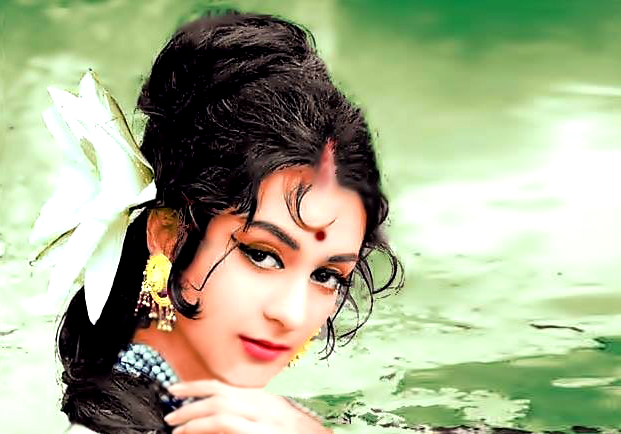Saira Banu was born in India to actress Naseem Banu and film producer Mian Ehsan-ul-Haq, who produced the film Phool in Mumbai and film Wadah in Pakistan. Her grandmother was the courtesan Chamiyan Bai, also known as Shamshad Begum of Delhi (not to be confused with the famous playback singer of yesteryear Shamshad Begum who was from Amritsar, Punjab). Her niece is former actress Shaheen Banu who is the daughter of her brother Sultan. Saira spent a significant part of her childhood in London, and went to finishing school. Her grandmother was from Hasanpur (Uttar Pradesh).
She was 16 years old in 1960, the year she made her debut to Hindi films.[2] She said in a programme, that she had basic talent and little dancing experience. Her peers all were classically trained, which was why she wasn't put in the top league. Saira started taking Kathak and Bharata Natyam lessons with success and trained herself professionally. Soon she became a dancer and her films flaunted more of her dance. Banu made her acting debut opposite Shammi Kapoor in the 1961 film Junglee for which she earned her first Filmfare nomination as Best Actress. The famous song from this movie "Yaahoo!! Chahe Koi Mujhe Junglee Kahe" sung by Mohammed Rafi was a big success. 'Junglee' was written by Aghajani Kashmeri (aka Kashmiri and Agha Jani), who also coached her in Urdu dialogue delivery, given his background in Urdu literature and poetry from Lucknow. 'Junglee' also instantly made her a successful actress throughout the 1960s and early 1970s. Her image was that of a romantic heroine for love stories in the 1960s till 1967. She did one more film opposite Shammi Kapoor named Bluff Master directed by Manmohan Desai. Some of her successful romantic films include 'Jhuk Gaya Aasman' and 'Aayi Milan Ki Bela' with Rajendra Kumar and 'April Fool' with Biswajeet and 5 films with actor Joy Mukherjee - 'Aao Pyar Karen', 'Saaz Aur Awaaz', 'Door Ki Awaz', 'Yeh Zindagi Kitni Haseen Hai' and 'Shagird'. She did double role in the film 'Yeh Zindagi Kitni Haseen Hai'. After her mairrage in 1966, her first film to release was Aman opposite Rajendra Kumar and she continued to act as the lead heroine till 1977. But it is said that the turning point of her career was the comedy and love story Padosan in 1968 opposite Sunil Dutt, which brought her to the top league of the successful actresses and she started receiving more offers.
Her films with Navin Nishchol were very successful like Victoria No. 203 and Paise Ki Gudiya. In an interview she quoted that she regretted missing chance of working with Rajesh Khanna. She quoted "I was supposed to work with him in 'Choti Bahu'(1971) but I could not because I was ill. I shot with him for two days and found that he was very charming, humble and a shy person".[3] She did earn three additional Filmfare nominations as Best Actress for Shagird (1967), Diwana (1968), and Sagina (1974). Her valiant attempts to establish a reputation as an actress after Sagina and Bairaag (all 3 with Dilip Kumar) and films like Hrishikesh Mukherjee's Chaitali met with limited success although each of them were critically acclaimed. Her only film to be successful at box office opposite her husband was Gopi. She also had stable pairing with Dharmendra which included Jwar Bhata, Aadmi Aur Insaan, Resham Ki Dori, Pocket Maar, International Crook, and Chaitali. She also did 'Pyar Mohabbat' with Dev Anand and did two films with Manoj Kumar, namely 'Poorab Aur Paschim' and 'Balidan'. She established herself as versatile actor, post her marriage, with her performances in Padosan, Victoria 203, Jhuk Gaya Aasman, Sagina, Chaitali - with each of them belonging to different genres. She was paired with Vinod Khanna in Aarop wherein the song Naino Mein Darpan Hai became a chartbuster in 1974. Her pairing with Sunil Dutt continued to be good at box office with films like Nehle Pe Dehla being successful in 1976. The song Sawan Ka Mahina Aagaya became very popular in 1976. However, with films like Daaman Aur Aag, Mounto, Zameer, Koi Jeeta Koi Haara becoming disasters and with some of her films being kept on hold for release like Faisla, Mera Vachan Geeta Ki Kasam, Aarambh, she decided to not sign any more films. Hence in 1976, Saira chose to end her film career. Subsequently she weathered a storm in her marriage in 1980, when her husband married a girl named Asma, which was quickly resolved. She then appeared in a cameo opposite her husband in Duniya (1984) wherein the song Teri Meri Zindagi became very popular. Her last film Faisla where she was cast opposite Vinod Mehra which was completed in 1976 released in 1988.






No comments:
Post a Comment